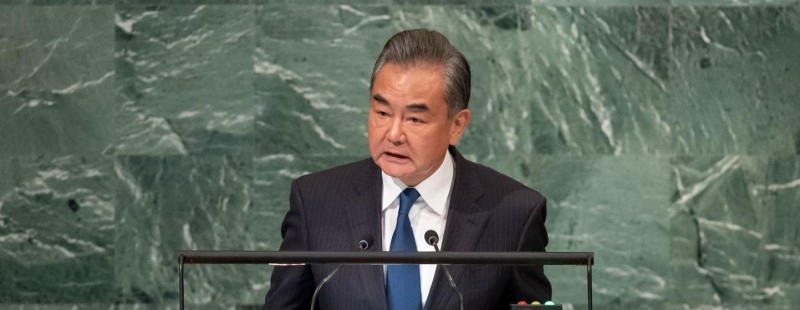Foreign Minister Wang Yi of the People’s Republic of China addresses the general debate of the General Assembly’s seventy-seventh session. Despite the world’s current phase of “turbulence and transformation”, there are “reasons for hope” amid broadening cooperation and deepening economic globalization, Chinese Foreign Minister Wang Yi told the UN on Saturday, as he also upheld the ‘One China’ policy as “international consensus.” “We are at a time fraught with challenges. COVID-19 keeps resurfacing, global security faces uncertainty, the economic recovery is fragile and unsteady, and various other risks and crises are emerging,” he said in his address to the UN General Assembly’s high-level debate. Nevertheless, amid this “new phase of turbulence and transformation” there were reasons for hope, Mr. Wang continued, pointing to the world’s increasing multipolarity, deepening economic globalization, and societies increasing digitalization and cultural diversity. “Peace and development remain the underlying trends of our time. People’s calls for progress and cooperation are getting louder. How should we respond to the call of our times and ride the trend of history to build a shared community for mankind?” he asked and responded with the words of Chinese President Xi Jinping, who has said that the world must stand up for peace and oppose war. “War only opens ‘Pandora’s Box…we must address differences through peaceful means.” Further, he called for the board pursuit of development and the elimination of poverty. Again, in the words of President Xi, Mr. Wang called for development to be placed at the center of the international agenda and for all countries’ right to development to be upheld. The international community must remain open and inclusive, as “openness is the surest way to prosperity.” Mr. Wang went on to say that as a permanent member of the UN Security Council and the world’s largest developing country, China is committed to solidarity and cooperation with other countries. “It will follow the trends of the times and pursue the shared interest of the vast majority of countries,” he stated, highlighting China’s efforts to maintain global peace and stability, including its adherence to the global non-proliferation regime and contribution to UN peacekeeping. China was also contributing to global development and had worked to keep global industrial and supply chains up and running. China is a major trading partner to over 130 countries and regions “is the global economy’s biggest engine… and a pacesetter in implementing the 2030 Agenda, having met the poverty reduction goal 10 years ahead of schedule,” Foreign Minister Wang said. China was upholding the international order and committed to the principles of the UN Charter and had backed the UN-centred international system. “China has been involved in multilateral affairs in all fields and… fulfilled in good faith its international obligations. China abides by the Universal Declaration of Human Rights and has made relentless efforts to protect and strengthen its human rights.” In this context, the Foreign Minister said that China stood firmly against attempts to politicize human rights and had worked to promote health development of international human rights cooperation. After detailing China’s commitment to a development path based on clean, green growth, and its cooperation initiative aimed at ensuring global food security, Mr. Wang said that China was also mediating global hotspot issues, “while adhering to the principle of non-interference and respecting the will and needs of countries concerned.” On the war in Ukraine, he said: “China supports all efforts conducive to the peaceful resolution of the crisis … and the fundamental solution is to address the legitimate security concerns of all parties and build a balanced, effective and sustainable security architecture.” “We call on all parties concerned to keep the crisis from spilling over and protect the legitimate rights and the interests of developing countries,” he added. Turning to Taiwan, which has been an “inseparable part of China’s territory since ancient times”, Mr. Wang stressed that its ‘One China’ policy has become a basic norm of the international relations and a consensus of the international community. His country would continue to work for the peaceful reunification with sincerity, he said, adding that, to realize this goal it must combat separatist activities with the firmest resolve and take the most forceful steps to oppose external interference. “Only when China is completely reunified, can there be enduring peace across the Taiwan Strait…Any move to obstruct China’s reunification is bound to be crushed by the wheels of history,” he said.
‘Stand up for peace, oppose war’
‘Agenda 2030 pacesetter’
Human rights
Mediating hotspots
Related Posts
WEJ PROJECTS
© 2009-2025, World Economic Journal. All Rights Reserved. Republishing permitted with attribution and active hyperlink to the original source.

